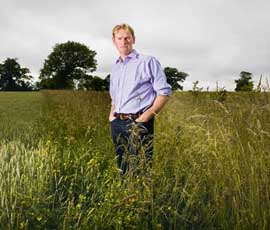FW Awards 2011: Farm Manager of the Year finalist – Simon Thompson

Simon Thompson
Sotterley Estate, Beccles, Suffolk
Simon Thompson is one of those individuals who, when you meet them, makes you wonder if there are far more than just 24 hours in a day and somehow you’re not aware of them.
Now 36, Simon has been at Sotterely for eight years, after working his way up through a series of farm management positions. His considerable energy has seen the farmed area grow by 25%, while his excellent grasp of financial management has reined in depreciation costs.
But Simon doesn’t believe there’s anything particularly unusual about what he has achieved. Modestly, the most he will admit is that: “The improved profits have come from getting crops established in time and in good condition.”
In reality Simon has expanded a narrow wheat/rape/beans rotation to introduce more high-value spring cropping – allowing major opportunities to strike at blackgrass and other problematic weeds. An innovative joint-venture arrangement with British Sugar saw him growing sugar beet this season, while there are 100ha (247 acres) of vining peas. Land is also let to specialist growers for potatoes and carrots, and a fledgling rose-growing enterprise.
“The objectives I have to meet are to safeguard the future of the estate, enhance its environmental aspects and remain farming in-hand, but profitably.” Simon’s personal objective is to increase the farming business further.
His energy and imagination have caught the eye of others too. Discussions are underway with three local farms to create a significant contract-farming venture, bringing economies of scale and other efficiencies to all the farms involved.
As well as changing the rotation, Simon has introduced an improved tillage system. He’s also been a local pioneer for establishing oilseed rape behind a subsoiler, and there’s no doubt that in this dry season the rape has benefited from the improved tap root growth.
But he’s also willing to take a calculated chance if he thinks the benefits outweigh the risks. Wet conditions in the autumn meant he was forced to broadcast a second wheat and roll it in the following spring – but the even canopy, even in a season as dry as this, is proof it was worth the risk. “My agronomist did say: ‘I’m glad that worked out for you, because a lot of other people would have thought you were mad’. But that’s farm management. You have to be willing to give things a try.”
Benchmarking is used extensively to assess the farms’ performance and Simon is rigorous in his approach to using information – whether that’s to monitor internal performance or qualify marketing decisions. He’s formed close working relationships with independent grain traders and uses options on future contracts and other tools to manage exposure to volatile grain markets. This has helped him produce returns consistently ahead of merchants’ pools for the past few years.
He’s also still very much hands-on. “I’ll get involved in a bit of irrigating, relief spraying and drilling, and a bit of combining.”
Simon has thrown as much energy and drive into the estate’s environmental aspects as the farming operation. When he arrived from Dorset, he found a blank canvas, with no existing Entry Level Stewardship scheme or Countryside Stewardship legacy. Simon’s response was typically ambitious – a major Higher Level Scheme is now in place. “Being a traditional estate with small fields, miles of hedges, woodland, parkland and a Site of Special Scientific Interest means environmental management is paramount.”
He’s also determined to demonstrate to the public exactly what farmers do for the public money they receive. So he’s teamed up with Natural England to host visits by school classes in nearby Lowestoft, where children can learn about food production and ecology, taking part in “mini-beast hunts”. Sotterley also provides a home for a care-farming project, where people suffering mental health issues can find respite through creative activity with others.
While Simon’s ambitions for expanding Sotterley’s farming business are clear, he’s someone who prefers his achievements to speak for themselves. “The main focus of my management is getting the work carried out in a timely manner, which is paramount to profitability.
Farm facts
* 1,620ha (4,000-acre) traditional English estate
* Farming 810ha (2,000 acres) in hand
* Renting and contract-farming additional hectares
The judges liked
* Kept machinery and depreciation costs in check
* Vision to expand the business
* Changed cropping to increase returns
